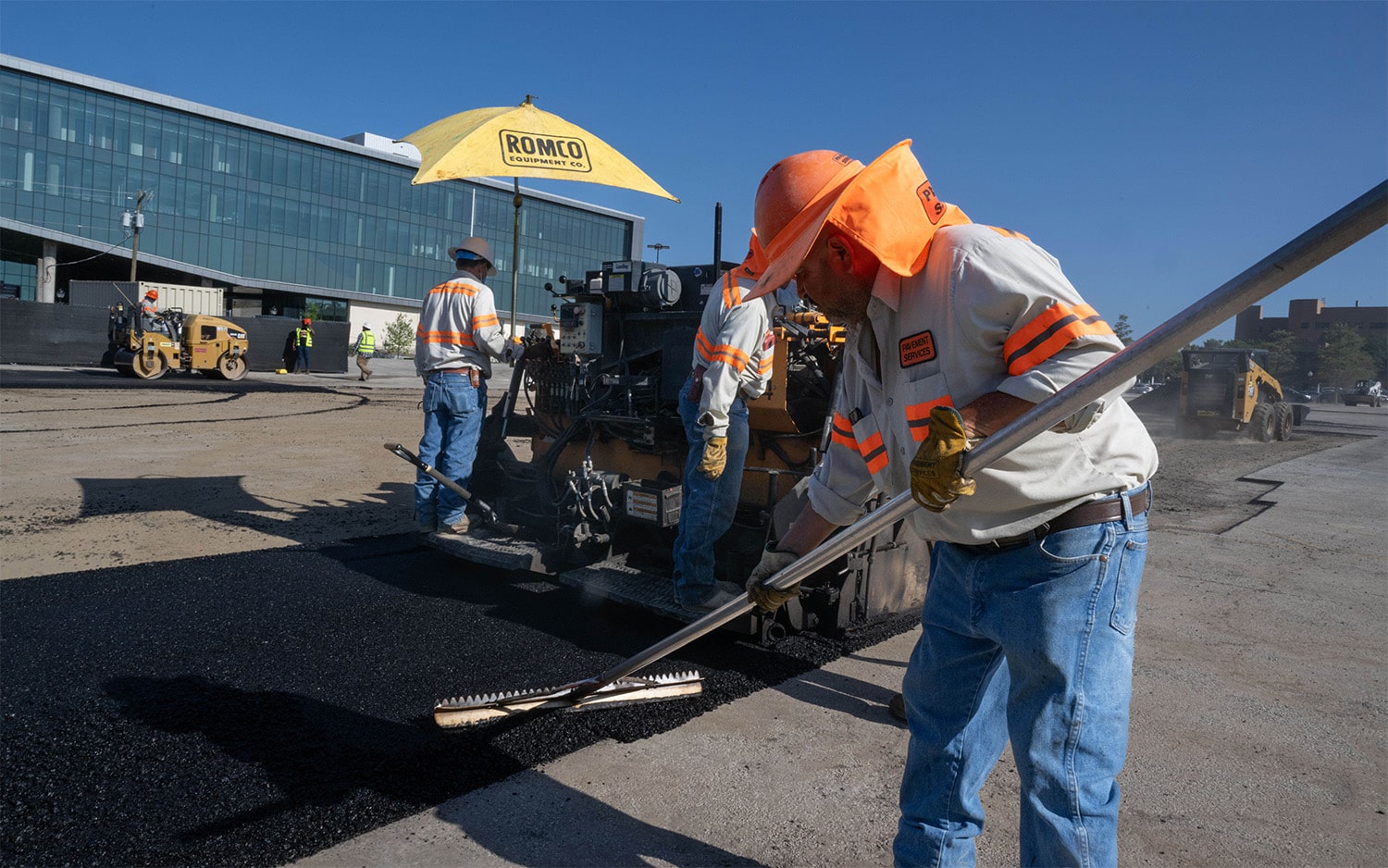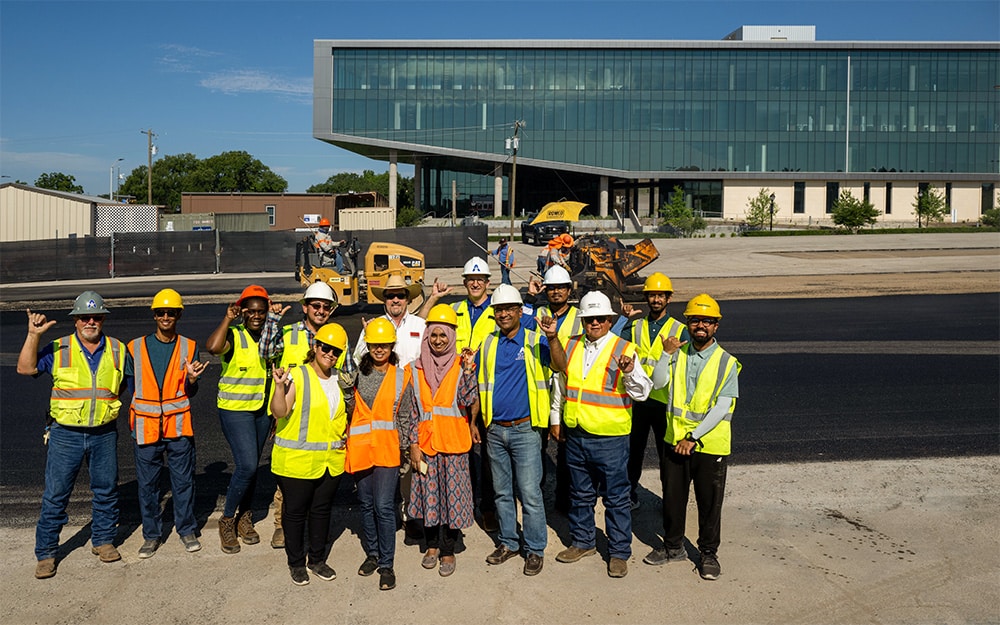
Who would have thought we’d be parking on plastic?
Yet, here we are, at The University of Texas at Arlington (UTA), doing just that. We have successfully implemented the first-ever application of plastic-infused asphalt in parking lot construction in the world, setting a new standard for how universities, municipalities, and private operators can reduce lot maintenance, extend longevity, build a sustainable, resilient, and green transportation infrastructure.
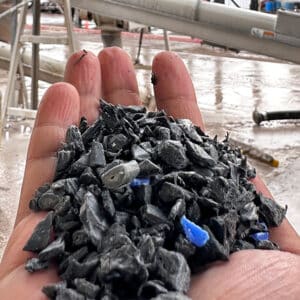
This transformative project was a collaboration that brought together diverse stakeholders, including UTA’s research community, operations team, students, and off-campus industry leaders Pavement Services and Austin Asphalt. With their combined expertise and resources, they embarked on an ambitious mission to address the complexities of incorporating recycled plastics into asphalt mixtures, a challenge that had never been tackled on such a scale.
The Road to Innovation
Partnering with Researchers
The journey began in 2019, led by Dr. Sahadat Hossain, professor and director of the Solid Waste Institute for Sustainability. Dr. Hossain and his team of graduate students received a $950,000 grant from the Dallas district of the Texas Department of Transportation, to be the first to use what’s now called “plastic road” material in Texas. Over three years, they successfully completed extensive laboratory investigations examining several uses for the reuse of waste plastics in asphalt, setting the stage for the first plastic road implementation project in the Kaufman area.
The initial lab tests involved mixing small batches of asphalt and plastic, then testing the wear and tear of simulated usage on the mix compared to mixes without plastic. The results were promising enough that the research team started to identify potential locations for this groundbreaking application of plastic-infused asphalt in real-world scenarios– a process that would take two years.
Unbeknown to the researchers at the time, UTA Parking & Transportation was preparing to repair several surface asphalt parking lots on campus. Through a public news release, the parking department became aware of the great work our faculty researchers were doing and offered a location on campus to install the mix. The next step was to find industry partners willing to try this innovative mix.
Overcoming Complex Challenges
An Inside Look
Taking this innovative concept from the laboratory to the real world was not without its challenges.
This transformative project was a collaboration that brought together diverse stakeholders, including UTA’s research community, operations team, and off-campus industry leaders Pavement Services and Austin Asphalt. With their combined expertise and resources, they embarked on an ambitious mission to address the complexities of incorporating recycled plastics into asphalt mixtures, a challenge that had never been tackled on such a scale.
Each partner had unique challenges to overcome. UTA’s plastic roads asphalt recipe required the asphalt plant, Austin Asphalt, to temporarily close several times during peak season to run our plastic trial and final mix batches. They also had to figure out how to introduce the plastic, the heat required to melt it, and how to clean their equipment after the batch was finished to ensure subsequent batches were not impacted. Pavement Services, the private company used to lay the asphalt, had uncertainty in how to lay and compress the asphalt, and how the plastic would change the way the asphalt is applied. However, these two private-industry partners were instrumental in their patience, willingness for trial and error, and aspiration for how this innovation could revolutionize the industry.
The Science Behind the Mix
A Revolutionary Approach
Dr. Hossain’s research discovered the right blend of plastic to asphalt to prolong the life of the asphalt, minimize wear-and-tear, and divert unused plastics from the landfill. The recycled plastics are shredded, then added to the asphalt mix under heat. The plastics melt and adhere to the aggregate, coating the materials in a durable surface that strengthens and prolongs the life of the parking lot.
Because the repair work was done in stages, it allowed the research team and partners to analyze different methods to determine the right size of aggregate to use in the mix. As a result, later batch recipes changed slightly as knowledge was gained through the application.
Benefits to the UTA Community
More Than Just a Parking Lot
The Plastic Roads Project is not just about innovating asphalt; it’s also a testament to the university’s commitment to preparing students for a greener world. This project involved students at every level, from PhD candidates whose dissertations focused on various research aspects of the plastic-asphalt mix to master’s degree graduate students studying principles of the circular economy and engineering principles.
Additionally, UTA students working in the private industry were assigned to this project to measure the compression needs of the laid asphalt.
However, the true impact of the Plastic Roads Project can be seen in the thousands of students and employees who utilize the new parking lots daily. This sustainable solution not only enhances their daily experience but also underscores UTA’s unwavering commitment to environmental stewardship and the preparation of future leaders dedicated to building a greener, more sustainable world.
The Plastic Roads Parking Lot Project serves as a beacon for environmental stewardship and offers tangible benefits to UTA, its students and employees. The Parking & Transportation Department will ultimately be able to maintain these facilities over a longer duration at lower expenses, thanks to the increased longevity and reduced maintenance requirements of the plastic-infused asphalt.
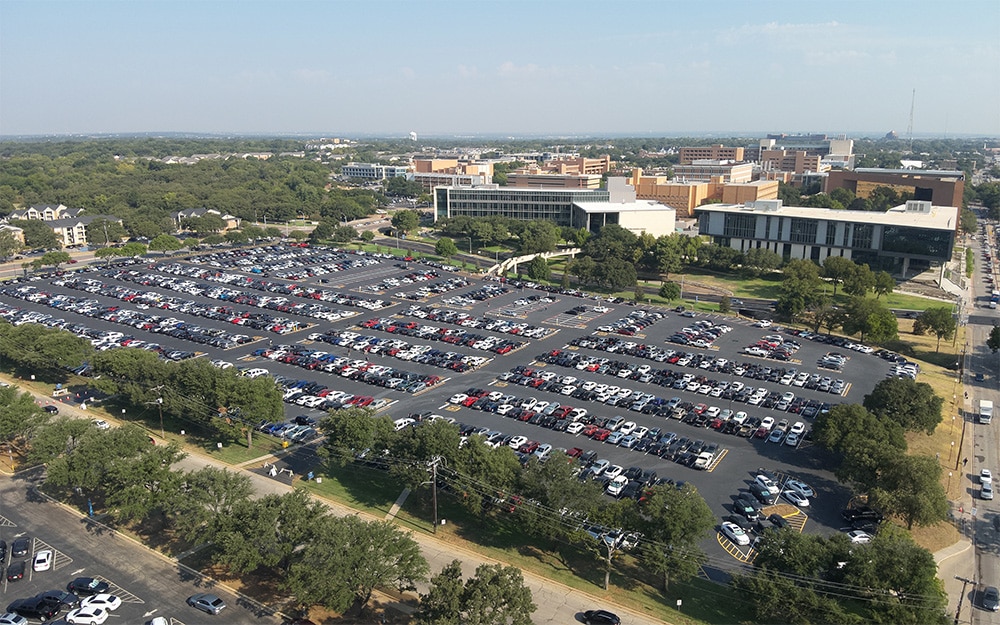
The Environmental Impact
Beyond the Campus
The world is moving towards a more urbanized future and the amount of municipal solid waste (MSW), one of the most important by-products of an urban lifestyle, is growing even faster than the rate of urbanization. Besides, due to rapid urbanization, plastic consumption has increased significantly, which in turn is creating plastic waste as a global epidemic. Being non-degradable, plastic is bad for the environment; however, the same characteristics can be excellent properties for reusing them in civil engineering construction and infrastructure projects. In recent years, climate change is causing frequent extreme events, such as hurricanes, extreme rainfall, drought, and flooding which is causing significant risk to transportation infrastructures. Therefore, the use of recycled plastic for climate adaptive sustainable, resilient, and green transportation infrastructure presents an opportunity for sustainable engineering and circular economy. Plastic waste can last in the environment for extended period without any degradation compared to other construction materials such as timber, steel, and concrete, which has high CO2 emission during the manufacturing process and work as contributor to global warming. The reuse of plastic waste for climate adaptive materials will reduce failure risks and maintenance cost of pavement and transportation infrastructure and will promote circular economy.
Therefore, the implications of this project extend far beyond the UTA campus. By successfully implementing this initiative, we have provided a blueprint for other institutions and municipalities to follow. The environmental benefits of diverting plastic waste from landfills and incorporating it into durable, long-lasting infrastructure cannot be overstated.
The Road Ahead Future Implications and Continuous Improvement
As we continue to monitor the performance of these innovative parking lots, the data collected will be invaluable in refining asphalt mix recipes for future applications. This commitment to ongoing evaluation and improvement ensures that UTA remains at the forefront of sustainable practices in parking lot construction.
The Global Stage
Dr. Hossain’s Impact
Dr. Hossain’s work has not gone unnoticed on the global stage. He recently met with the World Bank to discuss the implementation of plastic road projects in developing countries. A plastic road was just completed in Bangladesh in collaboration with Roads and Highway Department (RHD) in Dhaka, Bangladesh by Dr. Hossain’s team. Dr. Hossain signed another contract to implement plastic road in Addis Ababa, Ethiopia and the construction is expected to start in early 2024. Dr. Hossain is also in discussion with a group in Colombia to implement plastic road projects in Colombia by Summer 2024. These developments indicate that the technology is gaining traction globally.
A Legacy of Innovation
UTA’s Commitment to Excellence
In addition to this pioneering project to use recycled plastics for longer-lasting parking lots, the Parking and Transportation Department’s resume includes several other research partnerships that enhance the services provided to the campus community. These include launching the nation’s longest-running self-driving shuttle program in partnership with Via, May Mobility, and the City of Arlington, and reducing parking and traffic congestion through the introduction of a Parking Finder App and sensors, among many others. Our commitment to innovation and continuous improvement remains steadfast. ◆
Dr. Greg Hladik, Ph.D., is Executive Director of Auxiliary Services for the University of Texas at Arlington.
-
This author does not have any more posts.


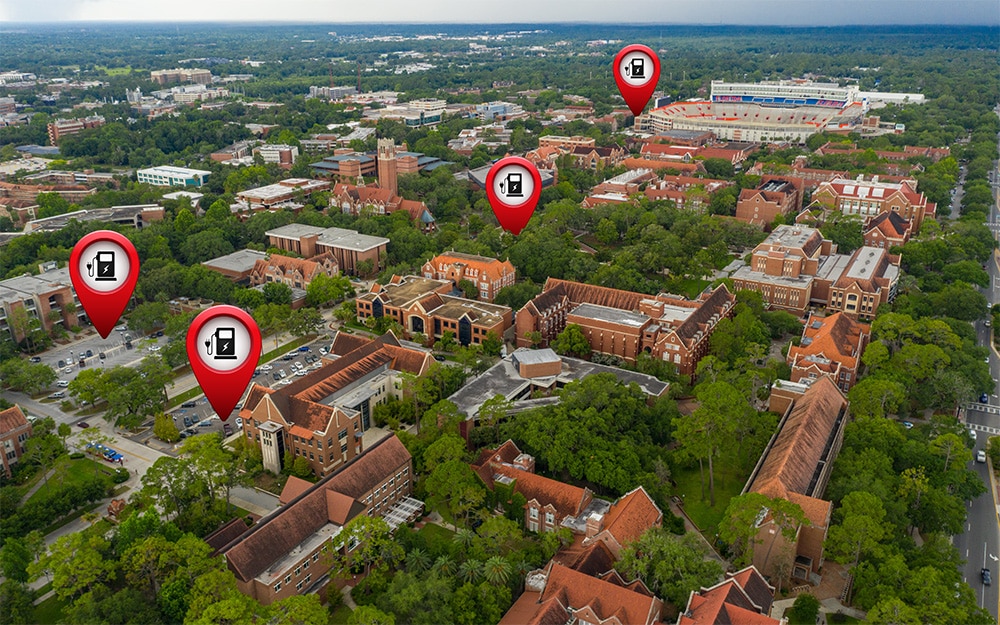
Overcoming the Electrification Challenge on Campus
Charting the Electrification Journey for Academic Campuses

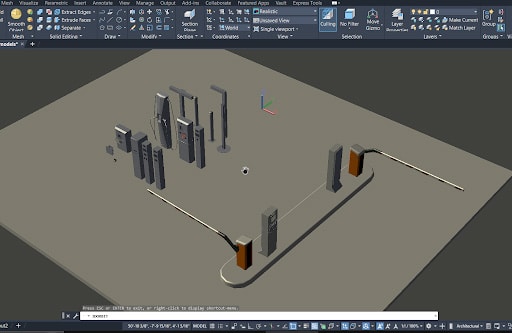
Innovation & Technology
The Future of Parking Technology
in Smart Building Design<

Easy as A, B, C
Creating and Implementing a University Mobility Master Plan

The Green Connection
EVs and Sustainable Farming for a Better Tomorrow

